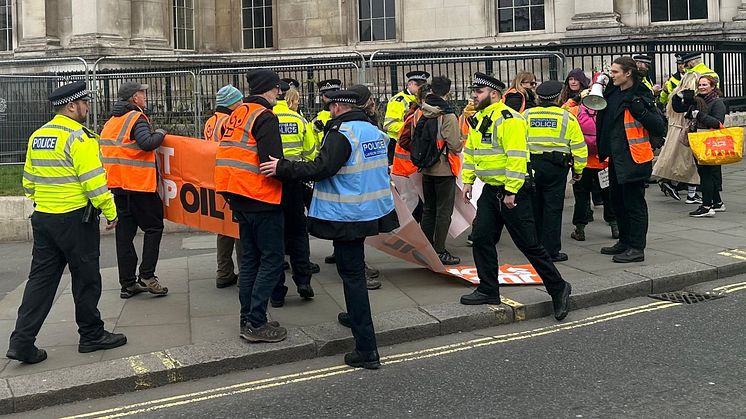
News -
11,000 officer shifts lost to policing Just Stop Oil protests in first four weeks of slow march campaign
Figures released following a month of sustained protests by Just Stop Oil show that officers have been extracted from other policing priorities for the equivalent of almost 11,000 shifts in an operation that has so far cost more than £3.5m.
The group launched three months of planned protest activity on 24 April, focused on a new tactic of ‘slow marching’ in the road to delay traffic and cause disruption to the public.
As of 22 May, 78 such marches have taken place at locations across London.
In 60 cases, officers determined that ‘serious disruption’ was being caused and have imposed conditions requiring the protestors to get out of the road. Serious disruption is the threshold in law that allows police to intervene.
In the vast majority of cases, the imposition of conditions under Section 12 of the Public Order Act has been enough to bring the protests to an end. Where that hasn’t happened officers have stepped in to make arrests. So far 45 people have been arrested for breaching conditions imposed, including eight earlier today (24 May).
Assistant Commissioner Matt Twist said: “I understand that many Londoners are concerned and frustrated by the deliberate disruption caused by Just Stop Oil. For the past four weeks we have deployed significant numbers of officers in central London specifically to respond to these protests – so far the amount of time lost to other policing priorities and to communities across the city stands at 10,677 shifts.
“Officers will respond as soon as we are aware of actions causing serious disruption. The time from disruption starting to officers imposing conditions and removing protestors has typically been between 13 and 19 minutes.
“The policing of protest is not straightforward. Officers are constantly required to balance the rights of those protesting with the rights of those who are impacted by the protest. We are assessing these situations in real time balancing complex human rights and legal considerations. Londoners can be assured that we are taking these issues seriously and it is clear from the number of times conditions have been imposed and arrests made, that there is no right to seriously disrupt others.
“Our officers are responding quickly and effectively to what is a new tactic of slow walking to cause maximum disruption. A short period of engagement and assessment after officers first arrive at each scene is unavoidable, but where we conclude that serious disruption is occurring we are intervening without delay to get traffic moving again.”
Unlike some groups, Just Stop Oil do not engage with police ahead of time so officers cannot be deployed at or near to the locations of planned protests. We continue to urge them to engage with officers in advance, so we can be present to assess the impact and prevent any breach of the peace.
In some cases, such as when protestors marched on Westminster Bridge on 17 May, the first officers are on scene in less than five minutes with conditions imposed and protestors removed quickly thereafter. There are occasions, however, where the initial response takes longer as officers make their way quickly but safely, often through rush hour traffic.
Regrettably there have been a small number of incidents where members of the public have intervened to challenge protestors, including by using force or damaging banners and other personal items.
AC Twist added: “We absolutely understand why those who are caught up in traffic delays will be frustrated. I would urge the public not to intervene or take matters into their own hands, but to call the police, let us know where the incident is and we will get there quickly.
“I know that a widely shared video of a member of the public confronting protestors on 23 May has reignited the strongly held public feelings about this protest tactic and how we are responding to it.
“But we must recognise that short clips of individual incidents don't tell the whole story of a much larger policing operation which, as we have shown, is ensuring that our response times are effective and that our interventions are seeing roads cleared with minimal delays.”
